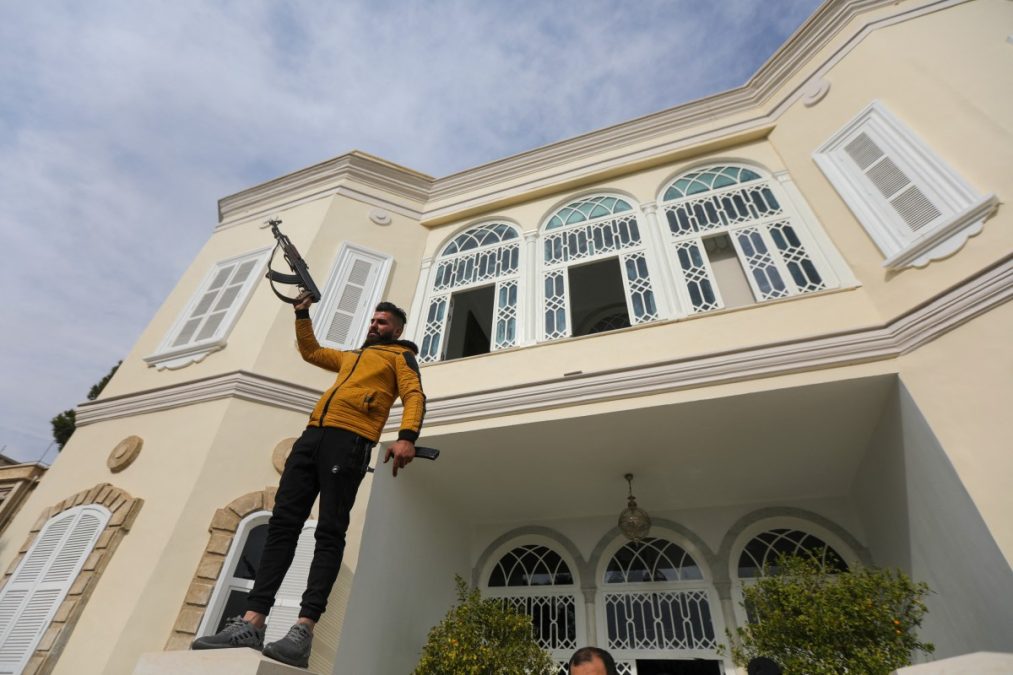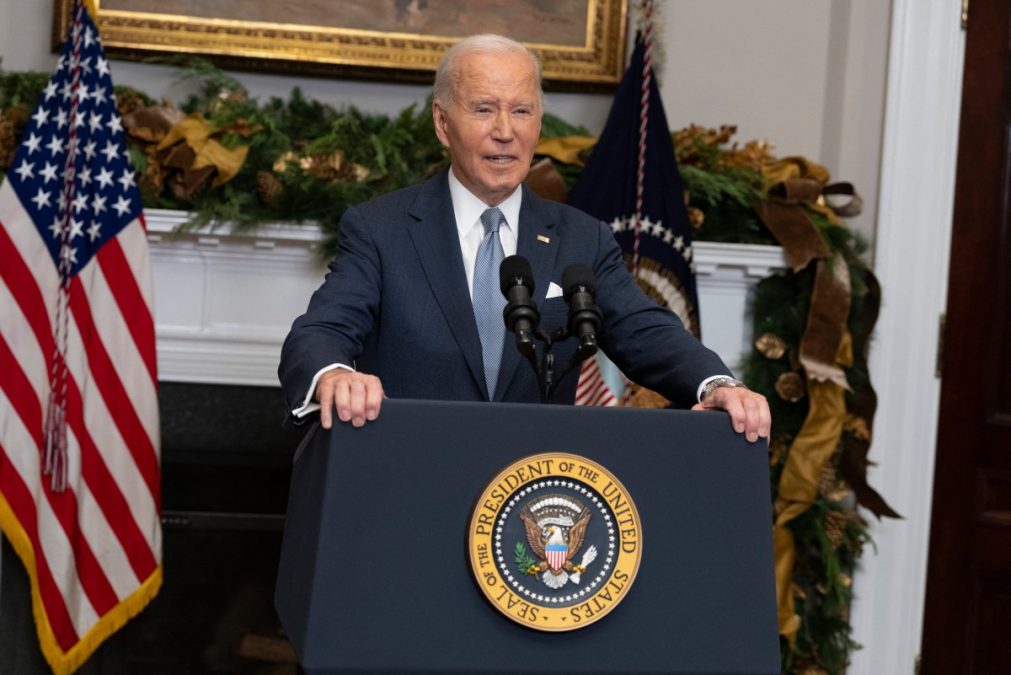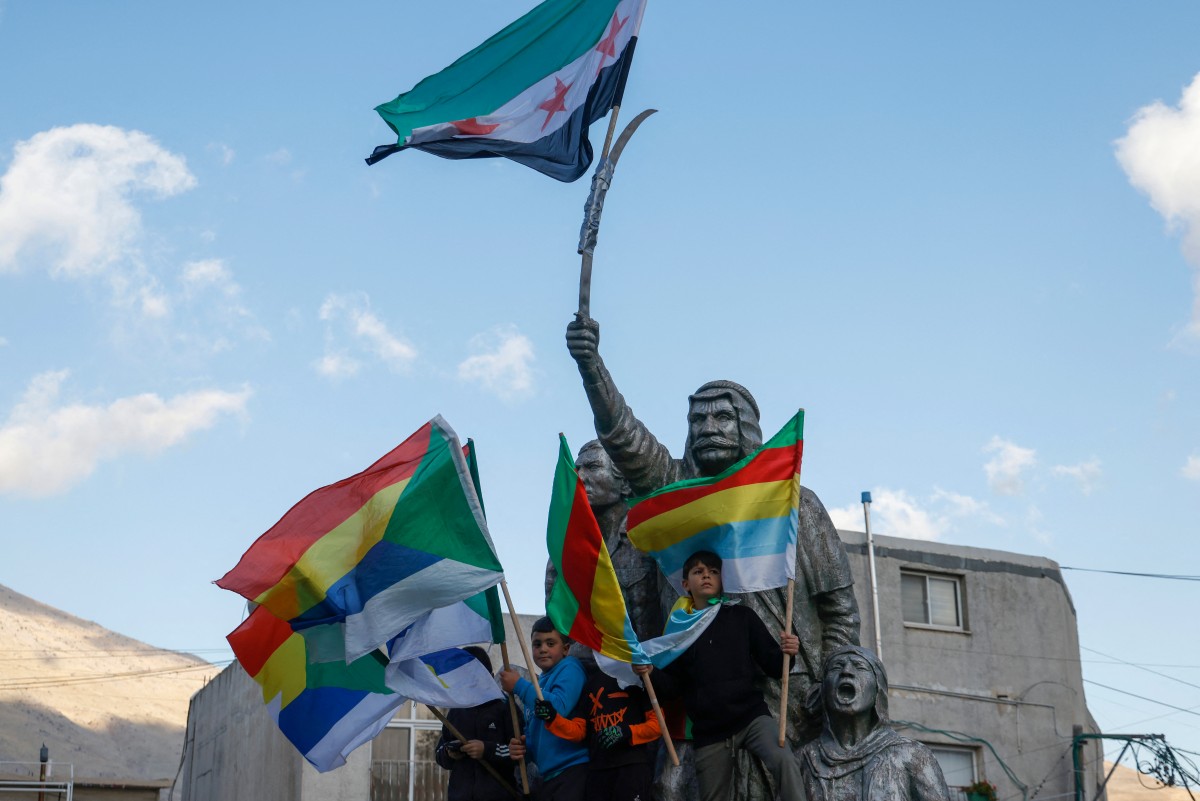Beirut, Lebanon – It took just 11 days for Syrian rebels to force Bashar al-Assad to flee the country and impose a new revision of the strategic map in the Middle East.
The Syrian strongman had for nearly 14 years held off an uprising that many believed had been exhausted. But his downfall followed a series of battlefield convulsions for other allies of Iran.
Israel has all but decapitated the Hezbollah leadership in Lebanon since September, while the killing of Hamas figureheads has dealt major blows to Assad’s key backer Tehran.
Andreas Krieg, a security specialist at King’s College London, said that Iran and other “Axis of Resistance” members would now have to concentrate on their “home turf”.
“And so the axis will lose its transnational flavour and its regional strategic depth.”
The lightning speed at which the rebels, dominated by the Islamist Hayat Tahrir al-Sham (HTS) group, took Aleppo and then the country stunned the whole world.
No one in Syria, or in the capitals that opposed or supported Assad, had expected Damascus to fall so quickly. Attention had been focused on the Gaza war between Israel and Hamas and Israel’s strikes on Hezbollah in Lebanon.
The 59-year-old Syrian leader long seemed secure with the backing of his Iranian, Russian and Hezbollah allies.
Some Arab neighbours had even started moves to normalise relations, strained since the civil war started with the repression of anti-government protests in 2011.
But HTS, which originated from Al-Qaeda before severing ties, smashed that outlook in just a few days when cities fell and statues of Assad’s feared father Hafez al-Assad were toppled.
Weakened allies
The Hamas attack on Israel on October 7, 2023, drew Iran and its “Axis of Resistance” allies into a conflict that has exposed their weaknesses.
Hezbollah’s military power has been undermined and its leader, Hassan Nasrallah, has been killed by Israel.

Israel had already been attacking Hezbollah’s military and financial supply lines from Iran through Syria.
That support faces a fresh threat from the new masters of Damascus who will point to Hezbollah’s crucial role in keeping Assad in power for so long.
Iran’s remaining supporters in Yemen and Iraq, while harassing the United States and its allies in the region, remain a nuisance but appear unable to effect major change.
Russia, embroiled in a resource-sapping war with Ukraine, also faces high stakes decisions as it biggest Middle East naval base is at Tartus on Syria’s Mediterranean coast.
“They are likely going to lose that,” said Krieg. “I can’t see how the new regime or the new socio-political order will allow the Russians to remain after everything the Russians have done to prop up the Assad regime.”
Turkey, a key supporter of the rebels, is the big regional winner from Assad’s fall, Krieg added.
But while it has influence, it does not control the rebels, he said.
‘Game over’
With conflict being fought on several Middle East fronts, the region will also have to handle the new US administration of Donald Trump.
“In a moment of complete uncertainty, this transformative event makes everything so unpredictable,” said Aron Lund, a specialist at the Century International think tank.
“It is not just Assad’s regime falling, it is also the question of what comes in its place? And how long does it take to crystallise? So you could easily have various types of regional contests play out in Syria,” Lund told AFP.
Various countries in the region had been backing different anti-Assad factions in Syria since 2011.
But the United Arab Emirates and other Gulf states had recently restarted relations with Assad, after over a decade of his isolation.
Many states have been fearful of Sunni Islamist groups such as the Muslim Brotherhood. They will face even greater challenges from the new Damascus rulers, said Lund.
“This is the Muslim Brotherhood on steroids, something much more militant and hostile to them,” he said.
But Israel, and its friends and enemies, expect the frontlines to shift again when Trump returns to the White House in January.
From Morocco to Saudi Arabia and Israel, countries will be hoping to secure Trump’s backing through his renowned deal-making diplomacy.
He had said in the past that the United States should not be involved in Syria’s war. But Trump will also have to deal with a new Middle East.
Krieg said events in Syria should also be a warning to the leaders in Libya, Egypt and Tunisia that also saw uprisings during the Arab Spring.

“It is game over for the myth of ‘authoritarian stability’,” he said. “Game over for the counter-revolutionaries in Russia, UAE and Iran.”
Biden calls for Assad to be ‘held accountable’
US President Joe Biden on Sunday said deposed Syrian leader Bashar al-Assad should be “held accountable” but called the nation’s political upheaval a “historic opportunity” for Syrians to rebuild their country.
In the first full US reaction to Assad’s overthrow by an Islamist-led coalition of rebel factions, Biden also warned that Washington will “remain vigilant” against the emergence of terrorist groups, announcing that US forces had just conducted fresh strikes against militants from the Islamic State organization.
“The fall of the regime is a fundamental act of justice,” Biden said from the White House. “It’s a moment of historic opportunity for the long-suffering people of Syria.”
Asked by reporters what should happen to the deposed president, who reportedly has fled to Moscow, Biden said “Assad should be held accountable.”
Biden — set to step down in January and make way for Republican Donald Trump’s return to power — said Washington will assist Syrians in rebuilding.
“We will engage with all Syrian groups, including within the process led by the United Nations, to establish a transition away from the Assad government toward independent, sovereign” Syria “with a new constitution,” he said.
However, Biden cautioned that hardline Islamist groups within the victorious rebel alliance will face scrutiny.
“Some of the rebel groups that took down Assad have their own grim record of terrorism and human right abuses,” Biden said.
The United States had “taken note” of recent statements by rebels suggesting they had since moderated, he said, but cautioned: “We will assess not just their words, but their actions.”
Biden said Washington is “clear eyed” that the Islamic State extremist group, often known as ISIS, “will try to take advantage of any vacuum to reestablish” itself in Syria.
“We will not let that happen,” he said, adding that US forces on Sunday conducted strikes against ISIS inside Syria.
The US military said warplanes hit Islamic State operatives and camps.
Strikes were carried out against “over 75 targets using multiple US Air Force assets, including B-52s, F-15s, and A-10s,” the US Central Command said.
‘Reason for hope’
Assad’s reported departure comes less than two weeks after the Islamist Hayat Tahrir al-Sham (HTS) group challenged more than five decades of Assad family rule with a lightning rebel offensive that broke long-frozen frontlines in Syria’s civil war.
They announced Sunday they had taken Damascus and that Assad fled, prompting nationwide celebrations and a ransacking of Assad’s luxurious home.
A Kremlin source told Russian news agencies the deposed leader and family were now in Moscow.
Secretary of State Antony Blinken echoed Biden’s optimism, saying that “after 14 years of conflict, the Syrian people finally have reason for hope.”
He also reiterated the need for justice and vigilance.
“We will support international efforts to hold the Assad regime and its backers accountable for atrocities and abuses perpetrated against the Syrian people, including the use of chemical weapons.”
One outstanding concern is the fate of the Syrian government’s apparent stockpile of such weapons, and whether they will fall into rebel hands.
“We are taking very prudent measures in that regard,” a senior US administration official told reporters Sunday.
The US military has “good fidelity” on the location of chemical weapons, the official said, stressing that “we’re doing everything we can to prudently ensure that those materials… obviously are either not available to anyone or are cared for.”
Damascus has been accused on numerous occasions of using chemical weapons, charges it denies.
The US military has around 900 troops in Syria and 2,500 in Iraq as part of the international coalition established in 2014 to help combat the Islamic State jihadist group.
It has regularly struck targets in the country including those linked to Iranian-backed militias. Tehran was a major backer of Assad’s government.
Biden also confirmed US authorities believe the American journalist Austin Tice, who was abducted in Syria in 2012, is still alive, but they have yet “to identify where he is.”
Syrians rejoice as Assad flees
Syria’s president Bashar al-Assad fled Syria as Islamist-led rebels swept into Damascus Sunday, triggering celebrations across the country and beyond at the end of his oppressive rule.
Russian news agencies late Sunday said Assad and his family were in Moscow.
Crowds toured Assad’s luxurious home after the rebels declared he had fled, a spectacular end to five decades of brutal Baath party government.
The government fell 11 days after the rebels began a surprise advance more than 13 years after Assad’s crackdown on anti-government protests ignited Syria’s civil war, which had become largely dormant until the rebel push.
“This victory, my brothers, is historic for the region,” Abu Mohammed al-Jolani, leader of the Islamist Hayat Tahrir al-Sham group (HTS) that spearheaded the advance, said in an address at the landmark Umayyad Mosque in Damascus.
US President Joe Biden said Assad should be “held accountable” but called the nation’s political upheaval a “historic opportunity” for Syrians to rebuild their country.
“The fall of the regime is a fundamental act of justice,” Biden said from the White House.
‘Syria is ours’
Residents cheered in the streets as the rebel factions heralded the departure of “tyrant” Assad, saying: “We declare the city of Damascus free.”
Celebratory gunfire sounded along with shouts of, “Syria is ours and not the Assad family’s”.
AFP correspondents saw dozens of men, women and children wandering through Assad’s modern, spacious home whose rooms had been stripped bare.
“I can’t believe I’m living this moment,” tearful Damascus resident Amer Batha told AFP by phone.
“We’ve been waiting a long time for this day,” he said.
The rebel factions on Telegram proclaimed the end to “50 years of oppression under Baath rule, and 13 years of crimes and tyranny and displacement”.
It is, they said, “the start of a new era for Syria.”
The foreign ministry of Assad’s key backer, Russia, had announced earlier Sunday that Assad had resigned from the presidency and left Syria.
The head of war monitor the Syrian Observatory for Human Rights, Rami Abdel Rahman, told AFP: “Assad left Syria via Damascus international airport before the army security forces left” the facility.
Later Sunday, a Kremlin source told Russian news agencies that he and his family had arrived in Moscow where they had been granted asylum “on humanitarian grounds”.
‘Historic opportunity’
Around the country, people toppled statues of Hafez al-Assad, Bashar al-Assad’s father and the founder of the repressive system of government he inherited.
For the past 50 years in Syria, even the slightest suspicion of dissent could land one in prison or get one killed.
During their advance, the rebels said they had freed prisoners, including on Sunday at the Sednaya facility, notorious for the darkest abuses of Assad’s era.
UN war crimes investigators urged those taking charge in the country to ensure the “atrocities” committed under Assad’s rule are not repeated.
Amnesty International called this a “historic opportunity” for those responsible for the abuses in Syria to face justice.
The end of Assad’s rule came just hours after HTS said it had captured the strategic city of Homs.
Homs was the third major city seized by the rebels, who began their advance on November 27, the same day a ceasefire took place in neighbouring Lebanon between Israel and the Iran-backed Hezbollah movement.
Hezbollah had supported Assad during the long civil war but has been severely weakened by Israeli strikes.
The group’s forces “vacated their positions around Damascus”, a source close to the group said Sunday.
HTS is rooted in the Syrian branch of Al-Qaeda but has sought to soften its image in recent years. It remains listed as a terrorist organisation by Western governments.
On Sunday afternoon the rebels announced a curfew in the capital until 5:00 am (0200 GMT) Monday.
The commander of Syria’s US-backed, Kurdish-led Syrian Democratic Forces (SDF), which controls much of northeast Syria, hailed the fall of Assad’s “authoritarian regime” as “historic”.
A military council affiliated with the SDF clashed Sunday with Turkish-backed Syrian fighters in Syria’s north, leaving 26 fighters from both sides dead, the Observatory said, as the Turkish-backed group launched an offensive on the Manbij area.
‘We’re going home’
The Observatory said Israel had struck government security buildings and weapons depots Sunday on the outskirts of Damascus, as well as in the eastern Deir Ezzor province.
Israeli Prime Minister Benjamin Netanyahu said the overthrow of Assad was a “historic day in the… Middle East” and the fall of a “central link in Iran’s axis of evil”.
“This is a direct result of the blows we have inflicted on Iran and Hezbollah, Assad’s main supporters,” he added.
The UN envoy for Syria said the country was at “a watershed moment”. Turkey, which has historically backed the opposition, called for a “smooth transition”.
Iran said it expected “friendly” ties with Syria to continue, even as its embassy in Damascus was vandalised.
Since the start of the rebel offensive, at least 910 people, mostly combatants but also including 138 civilians, have been killed, the Observatory said.
Syria’s war has killed more than 500,000 people, and forced half of the population to flee their homes.
Millions fled abroad.
“I can barely remember Syria,” said Reda al-Khedr, who was only five years old when he and his mother escaped Syria’s Homs in 2014.
“But now we’re going to go home to a liberated Syria,” he told AFP in Cairo.
Liberated, but facing enormous challenges.
European Commission President Ursula von der Leyen said Sunday the bloc would help rebuild a Syria that safeguards minorities after Assad’s fall.

